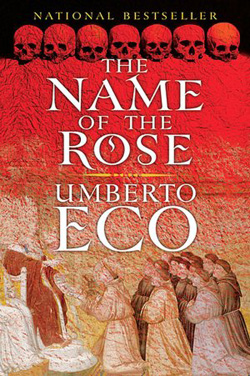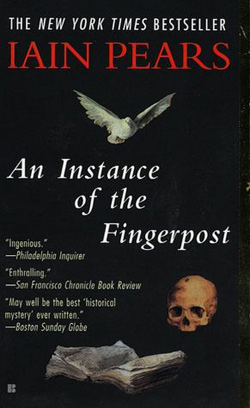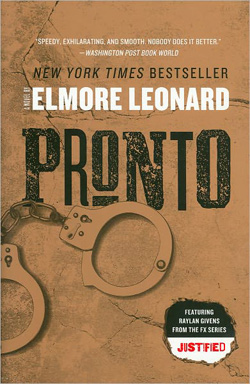
I think it’s a term weighted with the pressures of genre and literary snobbery, and I’d like to figure out if it’s an actual genre with a real definition, or if it’s a semi-fake, marketing word.
A snarky response is that a literary thriller (let’s use LT from here on out) is often a book people have heard of, but haven’t read. Umberto Eco’s books are all labeled LT’s, and, even though they’re bestsellers, I bet a sizable percentage of those who open Foucault’s Pendulum or The Name of the Rose don’t reach the end. Daphne Du Maurier’s Rebecca is well-respected, but I’m sure that many more people have seen the Hitchcock film than have read the book.
Other LT authors, such as Shirley Jackson, Norman Mailer, Robert Stone, Graham Greene, even Ian Fleming and John LeCarre have written classic books that incorporate dark, criminal elements. But are they more admired than read? And what, precisely, differentiates them from “regular” thriller authors?

Okay, so far we’ve determined that long, old, and occasionally foreign novels are called literary thrillers. The other common definition says that an LT is one where the words and characters “matter,” and the book’s not only about thrilling the reader, but about…art…or something. This definition says the author should be moving past what we expect from the genre and challenging the reader.
John Banville is as literary a writer as they come—he won the Man Booker Prize in 2005 and is considered one of Ireland’s best writers. Banville also writes mysteries under the name “Benjamin Black.” These books are very character driven—some readers would characterize them as boring, or books where not much actually happens. Banville/Black isn’t afraid to slow down the narrative in order to focus on his characters. In Elegy for April, for example, the reader isn’t even sure if there was a crime or not for nearly the entire novel. That’s definitely a subversion of genre expectations.
However, the problem with saying that LT’s, such as Banville/Black’s, are meant to “challenge” readers is that writers never intend to produce bad, cliché-laden books. Don’t all writers, regardless of what genre they might work in, want to do something new and interesting, yet also entertaining? This implies that authors can’t set out to write an LT, it’s something that happens if they’re a good enough writer—basically, a prize for doing something well.

I think my uneasiness with the term stems from the fact that genre literature gets such a bad rap. Adding “literary” to “thriller” implies your book is a bit more clever and well-written than other thrillers, yet not quite good enough to be “literary fiction.” That’s really where the distinction begins to bother me. Flannery O’Connor wrote some of the darkest, bloodiest fiction in American history, but no one is calling her books literary thrillers. So are we marginalizing authors such as Elmore Leonard or Carl Hiaasen when we simply by adding the term “thriller” to “literary.”?
Richard Z. Santos lives outside of Austin and is enrolled in the MFA program at Texas State University. Once, he worked in Washington, DC, but now he doesn’t do much more than write and teach. He blogs at Paperclip People, and is working on his first novel—a crime thriller set in New Mexico.

Interesting post. I did manage to finish The Name of the Rose, but it felt like duty by that point! And people who read Eco’s books (and similar) would look down on THOTR and definitely not call it literary. I’ve read most of Henning Mankell and The Secret History/Tartt, and I don;t know if they are “literary” in my book – to me they are just fiction. I don;’t think there is such a thing as a “literary thriller” though people do put John LeCarre into this pigeonhole. I certainly do not think that the first “Benjamin Black” novel qualifies (the only one I’ve read, and the last one i will read probably).
Excellent question, and I don’t blame you for not coming up with an answer. I’ve read a lot of these authors/books without knowing that they were considered a potential genre of their own. So, I started to wonder why I gravitate toward them and I think it’s because I am seeking stories with more detail, development and layering than a typical breezy mystery (which I also enjoy).
I did slog through TNOTH, which I wanted to love but didn’t. And I read An Instance of the Fingerpost, but I swear that all I remember is his discussion about the medicinal use of dog feces which, let’s face it, is not really an image I want burned into my mind forever.
Graham Greene I love. Ruiz-Zafon creates a beautiful atmosphere. And I just bought my first John LeCarre novel this week so we’ll see how that goes.
Thanks for making me think about this!
Thanks Maxine and Leslie–yeah it’s a weird genre or maybe it’s just a label. I gravitate to these books myself. And I think you’re right Leslie–these books usually have more development, etc. But then I wonder why they’re still called thrillers? Why aren’t they just books?
@Richard
Oh, that’s easy. Because “fiction” doesn’t sell as well as “thrillers.”
Yeah Laura I think you’re right. Calling it a “thriller” opens up whole new markets, but it also closes a few.
So true Richard!
Some people are Writers. Others are Story-Tellers. Few are both.
I think the term Literary Thriller Writer should be reserved for those who embody both talents. I have tried to reflect this in my latest work – SOMEONE’S OUT THERE.
Perhaps the person who could lay claim to being the finest writer of Literary Thrillers of last century was Graham Greene, then farther back Will Shaekespeare.
Interesting read. I have a similar post on my blog. “What makes a book a psychological thriller.” It’s important for readers to know the sub-genre that a book is listed as. Visit here: [url=http://jmbrownpsychologicalthrillers.com/wordpress/2015/08/29what-makes-a-book-a-psychological-thriller/#comment/11]http://jmbrownpsychologicalthrillers.com/wordpress/2015/08/29what-makes-a-book-a-psychological-thriller/#comment/11[/url]
Great conversation. I think you have to first define “literary” vs. “genre.” Since we always dance around specific definitions, it’s hard to have the conversation without feeling like a bit of a pompous jerk when you mention literary anything. 😀
Literary writing can fit any genre, based on the tropes utilized and marketing potential. The difference is that often, genre fiction can’t say it’s literary. But that’s not always the case.
James Lee Burke, for example, writes genre mysteries that are literary by most versions of the definition. But he’s clearly a genre writer.
I would suggest that “literary” only means the story has elements that we typically characterize as literary tropes (deep themes, emotional resonance, and intellectual provocation that usually is absent in genre fiction), but that it still fits cleanly in genre fiction and suits a general audience for that category.
As someone who wanders from literary fiction to thrillers and faster reads, and back again, and is working on my own writing, I’ve thought about this question – in part as a goal-setting exercise (the great read that’s also well written). I think the Broken Shore, by Aussie writer Peter Temple, comes close. The writing is beautiful, characters run deep, but the book is also creepy and powerful and moves along, if not with lightning pace, but enough intrigue to see it through.
I found myself reading through this post and then further into the comments after searching for a clearer understanding of Celeste Ng’s Everything I Never Told You after finding it listed as a literary thriller/ mystery on various review pages. I understand this is a rather older publishing and am attempting to revitalize it some for any means of satisfaction and learning a bit about what its like to participate in the literary community. I’m not a social recluse or anything, just a junior in high school trying to answer a query of mine for an english presentation on E.I.N.T.Y.. I am trying to hash out an interesting discussion topic to present to a class that is quick to boredom. 🙂
I don’t see what the fuss is about. A literary thriller is a thriller written in a literary style. “What’s a literary style?” Well, let’s start with sentences that use of poetic devices. If you see metaphors, similes and juxtaposition (among others), you are dealing with literary fiction. Let’s take it a step further. Writing that uses these devices skillfully, which is to say, they enhance your understanding of the story rather than draw attention to themselves. But what about Minimalism, I hear you ask. Isn’t this is ‘literary writing’ that eschews adjectives, multisyllabic words and poetic devices in favor of a direct style? Yes and no. Chuck Palahniuk’s work is certainly literary, he just prefers to use other devices: assonance, alliteration, repetition, a certain attention to rhythm.
I think more attention should be paid to clearly defining literary genre fiction, and identifying the writers who create it, so readers can find them and give them their money. They are the best, in my opinion. They hit you in the gut and the head, rather than most writers who can only do one or the other.
I stumbled across this post–and the insightful comments–while trying to figure out what my novel-in-progress actually is. It’s a mystery-thriller with a serial killer and a main character threatened b/c of old secrets (that relate to said serial killer). But it goes deeper into character than most thrillers, and that makes the pace slower in places than is usually seen in the thriller genre. I want to keep both elements (mystery/thriller and in-depth character), but I don’t know if there’s room in the market for a book like this. When I heard about literary thrillers, I thought maybe I’d found the right fit… maybe.
I used to think “literary thriller” meant meant a thriller with writers or English profs as protagonists and set on campuses or in the publishing industry, lol.